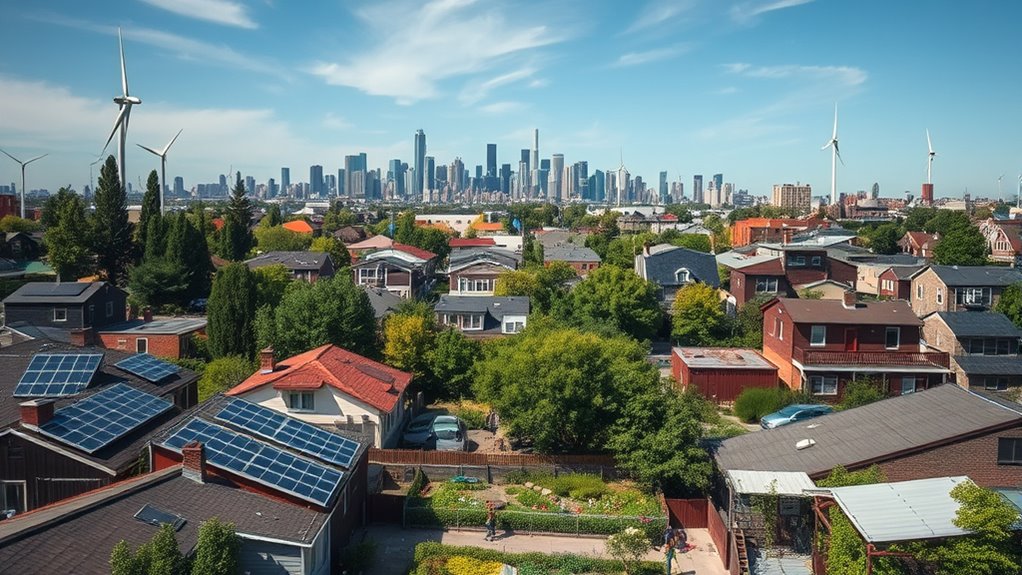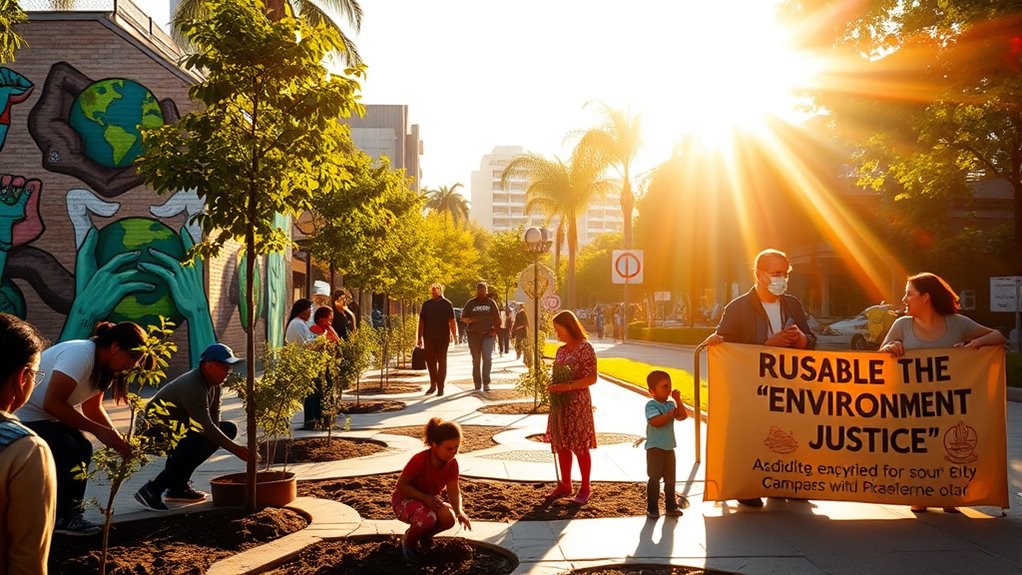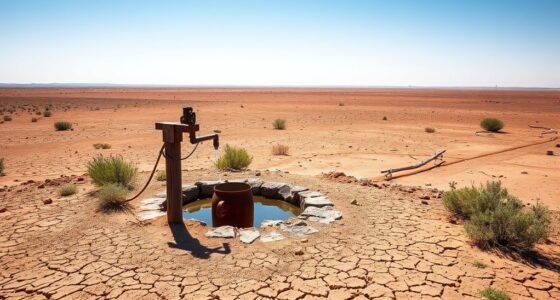To guarantee equity in sustainability through environmental justice policies, you need to actively involve communities in decision-making processes. This helps reflect local needs, build trust, and create culturally sensitive initiatives. Engaging communities also empowers them to monitor violations and hold authorities accountable. Transparency, informed policies, and inclusive enforcement improve overall effectiveness. If you keep exploring, you’ll discover how these strategies can help create fairer, more sustainable environments for everyone.
Key Takeaways
- Community engagement ensures policies reflect local needs and build trust, leading to more equitable and effective sustainability efforts.
- Involving communities in decision-making helps address disparities and prevents marginalized groups from bearing environmental hazards.
- Using environmental data promotes transparency, accountability, and culturally sensitive policies that support environmental justice.
- Empowering communities to monitor and report violations strengthens enforcement and compliance with environmental laws.
- Inclusive policies reduce environmental disparities, promote fairness, and foster sustainable development for all communities.

Environmental justice policies aim to address the unequal distribution of environmental benefits and burdens that often disproportionately affect marginalized communities. You play a crucial role in guaranteeing these policies work effectively by actively participating in community engagement efforts. When policies are crafted without input from those most impacted, they risk missing essential insights about local needs and concerns. Your involvement helps shape initiatives that truly reflect community priorities, fostering trust and ensuring that the benefits of sustainability reach everyone equally. By engaging residents, local leaders, and advocacy groups, you help bridge gaps between policymakers and the communities they serve, making environmental justice a tangible reality.
Community engagement isn’t just about consultation; it’s about creating a genuine dialogue where voices are heard and valued. You can attend town hall meetings, participate in workshops, or join local committees focused on environmental issues. Your input ensures that policies are not only well-informed but also culturally sensitive and responsive. When communities are actively involved in decision-making, policies tend to be more effective, sustainable, and equitable. Your participation can influence decisions surrounding pollution control, land use, and resource allocation, helping to prevent marginalized groups from bearing the brunt of environmental hazards. Additionally, understanding the fundamental principles of environmental justice can empower communities to advocate effectively for their rights and needs. Recognizing the importance of community-led monitoring can further strengthen enforcement efforts and community trust. Moreover, leveraging environmental data can improve transparency and accountability in enforcement practices. Incorporating equity-focused approaches in policy development ensures that the specific vulnerabilities of marginalized groups are adequately addressed. Furthermore, supporting agencies and organizations that monitor and enforce environmental laws can amplify your impact. Whether it’s reporting violations, participating in oversight committees, or simply spreading awareness, your active engagement reinforces policy enforcement. This collective effort ensures that environmental justice policies don’t just sit on paper but translate into tangible improvements on the ground. When communities are empowered to hold authorities accountable, you contribute to a system where enforcement is fair, transparent, and effective, ultimately reducing disparities and promoting sustainability for all. Recognizing the role of regulatory compliance helps ensure that policies are upheld consistently and effectively.
Frequently Asked Questions
How Do Environmental Justice Policies Impact Local Economies?
Environmental justice policies directly impact your local economy by addressing industrial pollution that harms communities. When these policies promote green job creation, you see new employment opportunities and economic growth. By reducing harmful emissions and supporting sustainable industries, you help your community become healthier and more resilient. These policies guarantee that economic benefits are shared equitably, empowering you and your neighbors while fostering a cleaner, more sustainable environment.
What Role Do Community Members Play in Policy Development?
Think of community members as the roots of a tree, grounding policy development in real needs. Your role involves active community engagement and policy advocacy, shaping decisions that impact your environment and well-being. By voicing concerns and sharing insights, you help guarantee policies are fair and effective. Your participation transforms abstract ideas into tangible change, making sustainability inclusive and equitable for everyone.
How Are Environmental Justice Issues Prioritized Nationally?
You see that environmental justice issues get prioritized nationally through active environmental advocacy and strong policies. Government agencies and organizations focus on equity implementation by identifying communities most affected and directing resources accordingly. Your involvement in advocacy efforts helps raise awareness and push for equitable policies. This guarantees that marginalized populations gain fair access to environmental benefits and protections, making sustainability efforts more inclusive and just across the nation.
What Funding Sources Support Environmental Justice Initiatives?
You can find funding opportunities for environmental justice initiatives through various sources. Federal agencies like the EPA offer grant programs specifically aimed at supporting communities facing environmental disparities. Additionally, state and local governments often provide grants, and nonprofit organizations may have their own funding options. Keep an eye on calls for proposals from these entities to secure the necessary resources to advance your environmental justice projects.
How Is Success Measured in Environmental Justice Policies?
Success in environmental justice policies is like planting seeds and watching them flourish; you measure outcomes to see how well they grow. You look at success indicators such as reduced disparities, improved health, and community engagement. By tracking these, you determine if policies are truly making a difference. Effective measurement tools help you understand progress, ensuring your efforts lead to equitable and sustainable change for all communities involved.
Conclusion
As you stand for environmental justice, remember it’s about more than policies—it’s about people. While progress can feel slow, every step toward equity brightens someone’s future. Imagine a world where no community bears the weight of pollution or neglect—that’s the promise of true sustainability. Your actions, no matter how small, create hope amid challenges. Together, we can turn the tide, transforming injustice into a legacy of fairness and resilience for generations to come.









